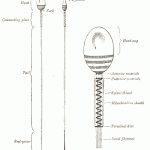January 26th, 2010 by DrCharles in Better Health Network, Health Tips
No Comments »

 Today NPR ran a story about fierce competition and cooperation among mouse sperm cells trying to fertilize an ovum. Apparently spermatozoa from the same male will often clump together, wiggling their flagella in a collective swim that accelerates the group faster towards an egg. In the race to be the first sperm to fertilize an egg this team approach (with sperm of a feather flocking together) may confer an evolutionary advantage. Solo-swimmers move more leisurely. The research and cool video presented on NPR were of sperm from the promiscuous deer mouse. Such murine sperm “behavior” may not be as evolutionarily needed in (usually) less promiscuous humans. Yet the idea of sperm cooperation, fitness, and competition in a microscopic steeplechase is fascinating. Read more »
Today NPR ran a story about fierce competition and cooperation among mouse sperm cells trying to fertilize an ovum. Apparently spermatozoa from the same male will often clump together, wiggling their flagella in a collective swim that accelerates the group faster towards an egg. In the race to be the first sperm to fertilize an egg this team approach (with sperm of a feather flocking together) may confer an evolutionary advantage. Solo-swimmers move more leisurely. The research and cool video presented on NPR were of sperm from the promiscuous deer mouse. Such murine sperm “behavior” may not be as evolutionarily needed in (usually) less promiscuous humans. Yet the idea of sperm cooperation, fitness, and competition in a microscopic steeplechase is fascinating. Read more »
*This blog post was originally published at The Examining Room of Dr. Charles*
December 4th, 2009 by Davis Liu, M.D. in Better Health Network, Opinion
3 Comments »

A recent article by NPR confirmed what many patients and doctors already know. The internet is leveling the playing field and allows individuals to access information easier and more quickly. Research by Pew Internet and American Life Project found:
- 61 percent of adults say they look online for health information – known as e-patients
- 20 percent of e-patients go to Internet and social-networking sites where they can talk to medical experts and other patients
- 39 percent of e-patients already use a social-networking site like Facebook
Yet as individuals embrace new technology, the New England Journal of Medicine found earlier this year that only 17 percent of doctors use electronic medical records. To say doctors are conservative and slow in adapting to new ways of communicating and accessing information would be an understatement. An article in TIME magazine proclaimed “Email Your Doctor” which graced newsstands in 1998! Email communications with doctors is still the exception rather than the rule. Read more »
*This blog post was originally published at Saving Money and Surviving the Healthcare Crisis*
June 9th, 2009 by RamonaBatesMD in Better Health Network, News
No Comments »

I want to say these two stories were well done (both aired on June 1, 2009). I was actually interviewed, but not quoted, for the story on fat-grafting. I pointed Allison Aubry to Dr Scott Spear as her expert. He is involved in one of the U.S. studies on breast augmentation using fat grafting.
Sculpting the Body with Recycled Fat by Allison Aubry.
Doctors Still Unsure Of Long-Term Risks
Surgeons like Dr. Scott Spear of Georgetown University Hospital want to know more about the techniques used to transfer fat for breast augmentation.
“We’re at the beginning of the learning curve,” he says. He has initiated a clinical trial to answer some questions about the best way to perform the procedure and whether there are any measurable risks. To date, there are no published studies in the United States, so doctors are relying on their own clinical experience.
Silicone Injections May Harm Some Patients by Patti Neighmond
When people get injected with silicone at pumping parties, Gorton says “there is no way to verify if they’re using medical-grade silicone. You can go to hardware stores and buy a big tub of it,” he says. “The element is the same, but it’s just not the same safety or purity or quality.”
*This blog post was originally published at Suture for a Living*
 Today NPR ran a story about fierce competition and cooperation among mouse sperm cells trying to fertilize an ovum. Apparently spermatozoa from the same male will often clump together, wiggling their flagella in a collective swim that accelerates the group faster towards an egg. In the race to be the first sperm to fertilize an egg this team approach (with sperm of a feather flocking together) may confer an evolutionary advantage. Solo-swimmers move more leisurely. The research and cool video presented on NPR were of sperm from the promiscuous deer mouse. Such murine sperm “behavior” may not be as evolutionarily needed in (usually) less promiscuous humans. Yet the idea of sperm cooperation, fitness, and competition in a microscopic steeplechase is fascinating. Read more »
Today NPR ran a story about fierce competition and cooperation among mouse sperm cells trying to fertilize an ovum. Apparently spermatozoa from the same male will often clump together, wiggling their flagella in a collective swim that accelerates the group faster towards an egg. In the race to be the first sperm to fertilize an egg this team approach (with sperm of a feather flocking together) may confer an evolutionary advantage. Solo-swimmers move more leisurely. The research and cool video presented on NPR were of sperm from the promiscuous deer mouse. Such murine sperm “behavior” may not be as evolutionarily needed in (usually) less promiscuous humans. Yet the idea of sperm cooperation, fitness, and competition in a microscopic steeplechase is fascinating. Read more »












